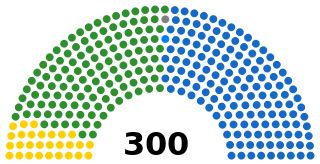 |
|---|
| This article is part of a series on the politics and government of Greece |
A referendum on the return of King Constantine I was held in Greece on 22 November 1920. [1] It followed the death of his son, King Alexander. The proposal was approved by 99.0% of voters. [2] The antivenizelist parties had recently won the elections of 1920. However the referendum is considered illegitimate by modern Greek historians.

Constantine I was King of Greece from 1913 to 1917 and from 1920 to 1922. He was commander-in-chief of the Hellenic Army during the unsuccessful Greco-Turkish War of 1897 and led the Greek forces during the successful Balkan Wars of 1912–1913, in which Greece expanded to include Thessaloniki, doubling in area and population. He succeeded to the throne of Greece on 18 March 1913, following his father's assassination.

Greece, officially the Hellenic Republic, self-identified and historically known as Hellas, is a country located in Southern and Southeast Europe, with a population of approximately 11 million as of 2016. Athens is the nation's capital and largest city, followed by Thessaloniki.

Alexander was King of Greece from 11 June 1917 until his death three years later, at the age of 27, from the effects of a monkey bite.
The result ensured and affirmed the dominance of the anti-Venizelist camp in the country. Constantine returned, albeit questioned by the supporters of the Liberal Party, while Liberal leader Eleftherios Venizelos maintained his silence, being in voluntary exile abroad.
Venizelism was one of the major political movements in Greece from the 1900s until the mid-1970s.
The Liberal Party, also the National Progressive Centre Union since 1952, was a major political party in Greece during the early-to-mid 20th century. It was founded in August 1910 by Eleftherios Venizelos and went on to dominate Greek politics for a considerable number of years until its decline following the Second World War. Among its most well-known members, apart from Venizelos, were Alexandros Papanastasiou, Nikolaos Plastiras, Georgios Papandreou and Konstantinos Mitsotakis.

Eleftherios Kyriakou Venizelos was an eminent Greek leader of the Greek national liberation movement and a charismatic statesman of the early 20th century, remembered for his contribution in the expansion of Greece and promotion of liberal-democratic policies. As leader of the Liberal Party, he was elected several times, in total eight, as Prime Minister of Greece, serving from 1910 to 1920 and from 1928 to 1933. Venizelos had such profound influence on the internal and external affairs of Greece that he is credited with being "the maker of modern Greece", and is still widely known as the "Ethnarch".

Constantine I was opposed by the Entente powers (United Kingdom, France, Italy) because of his pro-German stance during World War I (see National Schism) and his enthusiastic return was short-lived as a result of the disastrous military events that followed in the Asia Minor Campaign of 1922.

The United Kingdom of Great Britain and Ireland was established by the Acts of Union 1800, which merged the kingdoms of Great Britain and Ireland.

France, officially the French Republic, is a country whose territory consists of metropolitan France in Western Europe and several overseas regions and territories. The metropolitan area of France extends from the Mediterranean Sea to the English Channel and the North Sea, and from the Rhine to the Atlantic Ocean. It is bordered by Belgium, Luxembourg and Germany to the northeast, Switzerland and Italy to the east, and Andorra and Spain to the south. The overseas territories include French Guiana in South America and several islands in the Atlantic, Pacific and Indian oceans. The country's 18 integral regions span a combined area of 643,801 square kilometres (248,573 sq mi) and a total population of 67.3 million. France, a sovereign state, is a unitary semi-presidential republic with its capital in Paris, the country's largest city and main cultural and commercial centre. Other major urban areas include Lyon, Marseille, Toulouse, Bordeaux, Lille and Nice.

Italy, officially the Italian Republic, is a country in Southern Europe. Located in the middle of the Mediterranean Sea, Italy shares open land borders with France, Switzerland, Austria, Slovenia and the enclaved microstates San Marino and Vatican City. Italy covers an area of 301,340 km2 (116,350 sq mi) and has a largely temperate seasonal and Mediterranean climate. With around 61 million inhabitants, it is the fourth-most populous EU member state and the most populous country in Southern Europe.













